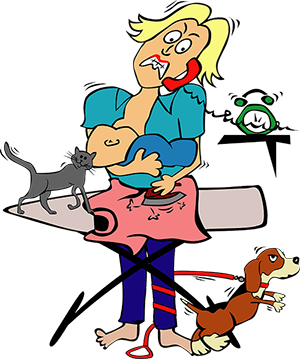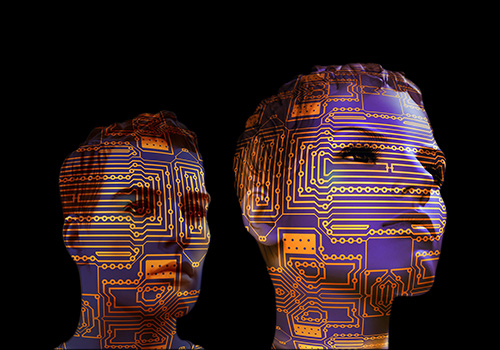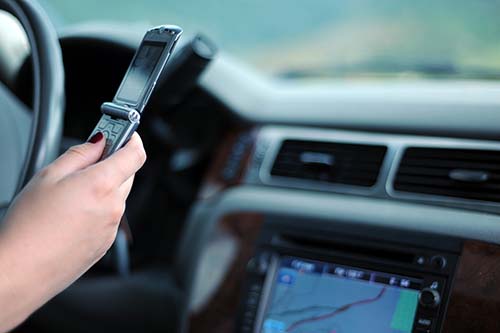 Walking down the street and texting, driving and talking on the phone, emailing during meetings, reading and watching the television.
Walking down the street and texting, driving and talking on the phone, emailing during meetings, reading and watching the television.
What do those things have in common?
Multitasking.
But what you call multitasking is really task-switching.
“When it comes to attention and productivity, our brains have a finite amount. It’s like a pie chart, and whatever we’re working on is going to take up the majority of that pie. There’s not a lot left over for other things, with the exception of automatic behaviours like walking or chewing gum, ” said Guy Winch, PhD, author of Emotional First Aid: Practical Strategies for Treating Failure, Rejection, Guilt and Other Everyday Psychological Injuries.
 Earl Miller, a neuroscientist at the Massachusetts Institute of Technology, scanned volunteers’ heads while they performed different tasks and found that the human brain has a hard time frantically switching between tasks, and it puts far more demand on our brains than if we did them one after another. It causes an overload of the brain’s processing capacity, especially if we are performing similar tasks like writing and talking because they use the same parts of the brain. That causes the brain to slow down.
Earl Miller, a neuroscientist at the Massachusetts Institute of Technology, scanned volunteers’ heads while they performed different tasks and found that the human brain has a hard time frantically switching between tasks, and it puts far more demand on our brains than if we did them one after another. It causes an overload of the brain’s processing capacity, especially if we are performing similar tasks like writing and talking because they use the same parts of the brain. That causes the brain to slow down.
If You Think You’re Good At Multitasking, You Aren’t!
Stanford University researchers discovered that those who think they multitask well and that it helps their performance were actually worse at it than others. They had more trouble organizing their thoughts and filtering out irrelevant information, they were slower at switching from one task to another, their memories were worse and they were constantly distracted.
Multitasking Rewires Our Brains.
 Multitasking change the pathways in our brains so that staying focused becomes impossible. We now know that our brains are plastic and adaptable and will change according to our thoughts. The brain changes the way it thinks and then it is very hard to change it back again.
Multitasking change the pathways in our brains so that staying focused becomes impossible. We now know that our brains are plastic and adaptable and will change according to our thoughts. The brain changes the way it thinks and then it is very hard to change it back again.
Multitasking Slows You Down
It is estimated that switching between tasks causes a 40% loss in productivity because you are never completely focused on one activity. It seems that much larger parts of the brain are activated than are irrelevant to either job. There is also an increase in mistakes especially if one or more of your activities involves a lot of critical thinking because you are missing important information. Even automatic behaviours like driving take longer. In a 2008 University of Utah study, drivers took longer to reach their destinations when they chatted on cell phones.
Multitasking Can Kill You
 We know that texting or talking on a cell phone is as dangerous as driving drunk. One study showed that the crash risk when texting was 23 times greater than when not texting. Drivers who texted had their eyes off the road for an average of 5 seconds, which is long enough to go the length of a football field for someone driving at 55 miles per hour.
We know that texting or talking on a cell phone is as dangerous as driving drunk. One study showed that the crash risk when texting was 23 times greater than when not texting. Drivers who texted had their eyes off the road for an average of 5 seconds, which is long enough to go the length of a football field for someone driving at 55 miles per hour.
But even driving with a hands-free device is dangerous. Dr. David Strayer of the University of Utah’s Applied Cognition Lab says that someone talking on a cell phone, hands-free or not, is about four times more likely to be involved in an accident than someone who isn’t using a cell phone. Even though they can see what is happening, the information doesn’t enter their brain while distracted by talking on the phone. In fact, they see up to half less of the information that they would normally have seen. People talking on cell phones tend to only look straight ahead, rather than also looking at things in their periphery by using their side mirrors and rear view mirror.
There have also been cases of death caused by the use of mobile devices while walking and stepping out into traffic. In one study, one in five teenagers who went to the emergency room after being hit by a car admitted they were using a smartphone at the time of the accident.
Multi-Tasking Increases Stress
One of the worst enemies for IBS sufferers is stress and when we multitask, stress hormones and adrenaline are released into the body. Then, because multitasking slows down our progress, we get stressed because we are not working faster. It’s a vicious cycle.
When University of California Irvine researchers measured the heart rates of employees, they found a higher heart rate in those who had constant access to email than those who didn’t. Those who didn’t have access to email, multitasked less and so were less stressed.
Life Passes You By
You are so busy switching between tasks that you are unaware of what is happening around you. A 2009 study from Western Washington University says that 75% of college students who walked across a campus square while talking on their cell phones did not notice a clown riding a unicycle nearby. Even though the cell-phone talkers were technically looking at their surroundings, none of it was actually registering in their brains.
Multitasking Can Make You Overeat
 With IBS, we know that we have to eat calmly and mindfully so we don’t gulp down air or cause our abdominal muscles to tense up. Overeating is also our enemy and being distracted during mealtime can prevent our brain from fully processing what we’ve eaten, according to a 2013 review of 24 previous studies. Because of that, you won’t feel as full, and may be tempted to keep eating. Even if you eat alone, don’t turn on the TV or eat in front of your computer – take a break and enjoy your meal.
With IBS, we know that we have to eat calmly and mindfully so we don’t gulp down air or cause our abdominal muscles to tense up. Overeating is also our enemy and being distracted during mealtime can prevent our brain from fully processing what we’ve eaten, according to a 2013 review of 24 previous studies. Because of that, you won’t feel as full, and may be tempted to keep eating. Even if you eat alone, don’t turn on the TV or eat in front of your computer – take a break and enjoy your meal.
Multitasking Damages Your Creativity
Multitasking takes up a lot of your brain space and so reduces your creativity according to research from the University of Illinois at Chicago.
“Too much focus can actually harm performance on creative problem-solving tasks,” the authors wrote in their 2010 study. With so much already going on in their heads, they suggest, multitaskers often find it harder to daydream and generate spontaneous “a ha moments.”
When you go for a walk, do you wear an earpiece and listen to a podcast? Do you listen to an audiobook when driving or working out? You might feel virtuous because you are multitasking and making the most of every moment of the day but you are actually harming your creativity by reducing the time you have to let your mind wander, to daydream, to plan. Listening to music is different as it can actually activate certain creative areas of the brain and works in the background, but following someone talking uses the cognitive parts of your brain to follow the narrative. Focus on the walk, the workout or the drive, which are fairly automatic activities, and allow your mind to wander.
Multitasking Makes You Stupid
 A study at the University of London found that participants who multitasked during cognitive tasks experienced IQ score declines that were similar to what they’d expect if they had smoked marijuana or stayed up all night. IQ drops of 15 points for multitasking men lowered their scores to the average range of an 8-year-old child.
A study at the University of London found that participants who multitasked during cognitive tasks experienced IQ score declines that were similar to what they’d expect if they had smoked marijuana or stayed up all night. IQ drops of 15 points for multitasking men lowered their scores to the average range of an 8-year-old child.
Glenn Wilson, a psychiatrist at the University of London, reported a few years ago that just thinking about multitasking can cause a problem. He found that sitting at your desk with easy access to email and the internet can knock a whole ten points from your IQ. This is similar to losing a whole night’s sleep.
Stop Multitasking
Changing from multi-tasking to focusing on one thing at a time requires a change of habit. You have to consciously decide to do one activity at a time and to eliminate all distractions, like, for example, turning off your phone and email, as well as closing all social media tabs on the computer. In this way, you will work more quickly and efficiently, make fewer mistakes, be more creative, be smarter and less stressed.
If you need any help with slowing down your life and reducing your stress and therefore your IBS symptoms, then join my FREE 2-week Life Balance Challenge, which starts on 14th May.




I love the “stupid” photo, and I love the message even more. Scientific research that supports saying “I can only do one thing at a time” — that is a great gift.
Society has really bought into this busyness badge of honour, and I see the damage it is doing every day in my clients.
I really needed to hear that as one who is easily distracted and frequently multi-tasking. And as an overachiever in recovery! Interesting book title too, “Emotional First Aid: Steps for treating…psychological injuries.” We don’t always give enough attention and “First Aid” to these types of injuries! Thanks Suzanne for posting.
Yvonne, it is so hard not to be distracted by the latest shiny object and to forget to follow our North Star.
I look for your newsletters everyday. I am looking forward to your challenge.
Great to hear, Kerry.